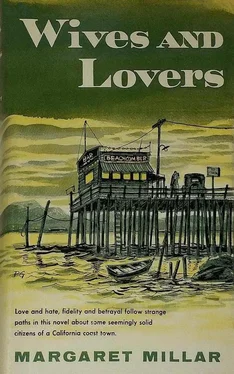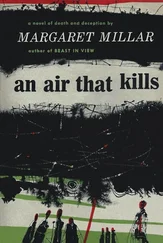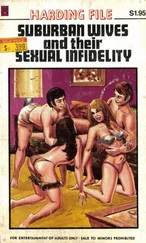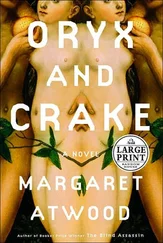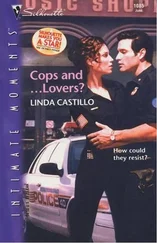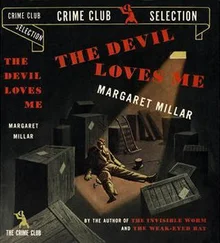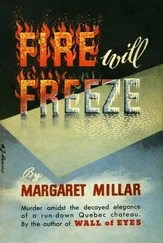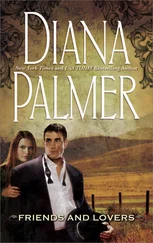Quincy Street was packed solid with small square frame shacks, their front windows no more than six feet from the sidewalk. Five hundred and nine was in the middle of the block, indistinguishable from its neighbors except for two potted geraniums precariously balanced on the sagging railing of the tiny porch. On the front door someone had printed in chalk, “Viva la Fiesta ,” and in ink, on a card above the doorbell, “Out of Order.”
She banged on the door with the side of her fist to make herself heard above the street noises, the rumble of roller skates, the shrieks of children, the barking of dogs. She was aware that people were watching her as they watched anyone new or different in the neighborhood. Windows were raised, blinds snapped up, lace curtains parted, eyes narrowed.
She knocked again and waited, half-hoping that Escobar would answer right away so that she could get the whole thing over with, and yet dreading the moment when she would come face to face with him and try to explain: Here is your hedge clipper, Mr. Escobar. You didn’t lose it, you didn’t leave it anywhere. I took it, yes, quite deliberately. I committed a sinful act. I must pay for it. I must—
A young Negro in a T-shirt and a straw hat came around the side of the house and looked at her over the porch railing.
He said, in a monotone, “Ain’t nobody in.”
“Oh.”
“They went away couple hours ago. Fishing. They eat a lotta fish.” He folded his arms on his chest and teetered back and forth on the balls of his feet. He was wearing very long pointed shoes the color of mustard. “I live next door. Name’s Jenkins.”
“I’m Miss Kane.”
He tipped his hat briefly. “Pleased to meet you.”
“I — you have no idea when they’ll be back?”
“Depends on the fishing.”
“Could I–I wonder if I could leave this parcel here on the porch? It’s Mr. Escobar’s hedge clipper.”
“Oh, that. I heard them talking about it. The walls are thin,” he added, as if that explained everything. “It fell off his bicycle.”
“No. No, it didn’t.”
“Just saying what I heard at supper.”
“He never had it on his bicycle!”
“Yes, ma’am.” Still holding his arms over his chest he took a step back, as if her voice had struck like a spear at his vital organs.
“I know, because I took it. I—” I stole it, I committed, a sin. I must expiate. Viva la Fiesta. Out of Order. She inhaled deeply and the hot dusty air rattled in her throat like gourds. “I took it and put it away in the garage — for safekeeping.”
“Yes, ma’am.”
“Tell him — tell him I found it in the back yard, just where he left it.” She propped the clipper up against the front door and turned away, wiping her hands on her skirt. “Tell him he is to be more careful of his tools in the future.”
“Yes, ma’am.”
“Thank you. Thank you very much, Mr. Jenkins.”
She walked back toward the bus stop, feeling extraordinarily light and agile without the weight of the hedge clipper. The noises of Quincy Street, the children, the dogs, the passing freight train, mingled with the remembered noise of the classroom into a pleasant dissonance she had not heard before.
Sitting on the concrete bench at the bus stop with her eyes closed against the wind and the sun, she breathed a quiet prayer. Thank you, Hazel, for being kind. Thank you, Mr. Escobar, for going fishing. Thank you, Mr. Jenkins. Thank you, God.
On Sunday night after church Elaine Foster went to her minister for advice. The minister, a worldly man called Kriger, knew perfectly well that Elaine was incapable of taking advice, so he didn’t offer any. Instead, he let her talk. She talked for over an hour, being as truthful as she ever had to anybody, and when she had finished she went home and phoned Ruth.
The following morning about eleven o’clock, Ruth arrived carrying a suitcase and leading Wendy by a leash.
Elaine met her at the door. She looked coldly at the dog but didn’t say anything.
She spoke in a stage whisper: “The children are playing in the kitchen. I don’t want them to know you’re here until we’ve had a chance to discuss matters. They get so excited.”
“Have you told them yet?”
“Just that Grandma was sick and I have to go to Chicago to look after her for a week or so. They wouldn’t understand the truth.”
“Perhaps not.” Ruth hesitated, and then reached down and took off the dog’s leash. “I hope you don’t mind my bringing Wendy. I thought the children might like — it might take their minds off things.”
“I don’t mind in the least.”
“Besides, there’s no one at home to look after her. Harold and Josephine are moving today. They found a small house in the canyon.”
“I am very fond of dogs,” Elaine said, and leaned over and patted the little dog firmly on the head.
Leaving the suitcase on the hall stairs the two women walked on tiptoe into the living room. The drapes were drawn so that the morning sun wouldn’t fade the carpet and the slipcovers, and the room was twilight dark. From the kitchen came the sounds of the children playing, muffled by closed doors. Everything seemed muted, as if somewhere in the house, a person was about to die and mustn’t be disturbed by noise or light or movement.
“I hate to leave,” Elaine said. “But the Reverend Kriger told me it was the best thing to do, go away for a while and gain some perspective, think things out. If I sat around here feeling sorry for myself, I’d go mad.”
“You’re holding up wonderfully well.”
“That’s what he said, too. Some women would be simply prostrate, he said, having the bottom drop out of their lives like this. But I can’t afford to give in to my emotions.” She paused. “I wired Mother last night. Not that she’ll be surprised, she’s never had much use for Gordon. She was practically heartbroken when I married him. Reverend Kriger didn’t actually say so, but he implied that perhaps I am being punished for not taking Mother’s advice in the first place.”
She began to pace up and down the room, and the little dog, thinking that she might be taking a walk, followed, sniffing, at her heels.
“I told you about the charge accounts at the market and the pharmacy.”
Ruth nodded.
“You’ll need some cash too, for the laundry and the paper boy and things like that. I’ve left fifty dollars for you in the top left-hand drawer of the buffet in the dining room. We haven’t discussed your salary yet.”
“There’s no hurry.”
“I don’t even know how much I’ll be able to pay you.”
“You mustn’t worry about it.”
“That’s what Reverend Kriger said, I mustn’t worry about other people so much, I must think of myself.” The Reverend Kriger had done nothing more than nod and make a sympathetic sound, but out of these Elaine had fabricated a whole moral philosophy: You must be completely selfish, Mrs. Foster. “He said, what about money, and I said, I don’t know, I just don’t know how we’ll manage. With the house to pay for and three children to feed and clothe we’ve never been able to put much aside.”
“Dr. Foster certainly won’t let you starve.”
“Won’t he?” Elaine’s mouth twitched with a grim little smile. “How will he make a living?”
“Hazel says he’s a wonderful dentist.”
“Really?”
“First-rate, she said.”
“It seems to me Hazel might be a little prejudiced.”
“Why?”
“That’s what I wonder, why.” She had stopped pacing and the little dog had stopped too, and was standing at her side looking up into her face, trying to read her expression. “I saw her this morning.”
Читать дальше
